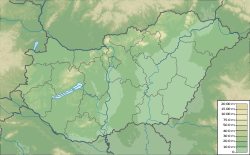Baja | |
|---|---|
 Town hall | |
| Nickname: The Capital of Fisherman's Soup | |
| Coordinates: 46°11′00″N 18°57′13″E / 46.1833°N 18.9537°E | |
| Country | |
| Region | Southern Great Plain |
| County | Bács-Kiskun |
| District | Baja |
| Government | |
| • Mayor | Klára Nyirati (Sikeres Bajáért Egyesület) |
| Area | |
| • Total | 177.61 km2 (68.58 sq mi) |
| • Rank | 20th in Hungary |
| Population (2023) | |
| • Total | 33,142 |
| Demonym | bajai |
| Population by ethnicity | |
| • Hungarians | 83.4% |
| • Germans | 4.3% |
| • Croats | 2.1% |
| • Gypsies | 1.2% |
| • Serbs | 0.5% |
| • Romanians | 0.2% |
| • Slovaks | 0.1% |
| • Bulgarians | 0.1% |
| • Others | 0.8% |
| Population by religion | |
| • Roman Catholic | 47.9% |
| • Greek Catholic | 0.1% |
| • Calvinists | 3.3% |
| • Lutherans | 0.6% |
| • Jews | 0.1% |
| • Other | 2.7% |
| • Non-religious | 16.0% |
| • Unknown | 29.2% |
| Area code | 79 |
| Website | www |
Baja (Hungarian pronunciation: [ˈbɒjɒ]) is a city with county rights in Bács-Kiskun County, southern Hungary. It is the second largest city in the county, after the county seat at Kecskemét, and is home to some 35,000 people. Baja is the seat of the Baja municipality.
The environs of Baja have been continuously inhabited since the end of the Iron Age, but there is evidence of human presence since prehistoric times. The settlement itself was most likely established in the 14th century. After the Ottoman Empire had conquered Hungary, it grew to prominence more than the other nearby settlements, and was granted town rights in 1696.
Today, Baja plays an important role in the life of Northern Bácska as a local commercial centre and the provider of public services such as education and healthcare. It has several roads and a railway connection to other parts of the country, and also offers local Public transport for its residents. Being close to the Danube and the forest of Gemenc, as well as having its own cultural sights, makes it a candidate for tourism, but this is not well established yet.



